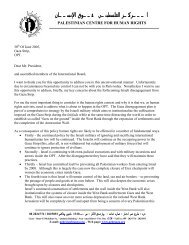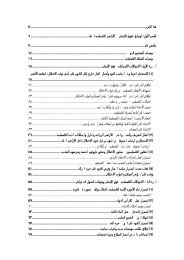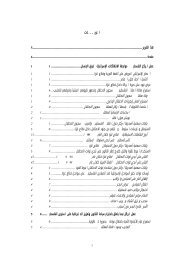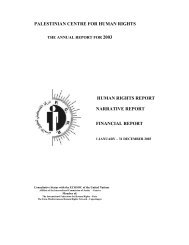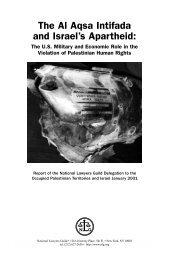Annual Report - Palestinian Center for Human Rights
Annual Report - Palestinian Center for Human Rights
Annual Report - Palestinian Center for Human Rights
You also want an ePaper? Increase the reach of your titles
YUMPU automatically turns print PDFs into web optimized ePapers that Google loves.
Racist Amendments to the Israeli Civil Wrongs Law to Deprive<br />
<strong>Palestinian</strong> Victims of Their Right to Seek Compensation<br />
In an attempt to cement the already existing laws, which discriminate against<br />
<strong>Palestinian</strong>s, on 27 July 2005, the Israeli Knesset passed Amendment No. 5 to the<br />
Civil Wrongs (Liability of State) Law. The amendment effectively stops <strong>Palestinian</strong>s<br />
in the OPT from seeking compensation in Israeli courts on the basis of their<br />
residence. The amendment is contrary to Israel’s international law obligations and<br />
demonstrates again the impunity that is granted to IOF by Israel.<br />
These amendments to the Civil Wrongs Law came in the context of a systematic<br />
pattern of previous limitations on the ability of <strong>Palestinian</strong>s from the OPT to claim <strong>for</strong><br />
injury and damage inflicted by IOF. In a previous amendment in 2002, the Israeli<br />
Knesset ensured that compensation claims would be out of reach <strong>for</strong> most <strong>Palestinian</strong>s<br />
through an expanded definition of what Israel calls “war time actions” and strict<br />
procedural amendments. However, under this 2002 amendment, <strong>Palestinian</strong>s broadly<br />
retained the right, under these severe restrictions, to claim compensation in the Israeli<br />
court system.<br />
Amendments to the Civil Wrongs Law approved by the Knesset, which entered into<br />
<strong>for</strong>ce on 10 August 2005, would prohibit, with retroactive effect back to September<br />
2000, a national of an “enemy state”, a member of a “terrorist” organisation or a<br />
person who suffered injury or damage in a “conflict zone” by the IOF from launching<br />
a compensation case in the Israeli legal system. The law defines a “conflict zone” as<br />
area outside the State of Israel that has been declared so by the Israeli Minister of<br />
Defence. It is clear that this broad term will be used to stop <strong>Palestinian</strong>s from<br />
seeking compensation in the future.<br />
PCHR is concerned that the amendments grant complete discretion to the Minister of<br />
Defence and even allow the Minister to determine an area a “conflict zone” after a<br />
<strong>Palestinian</strong> has filed a complaint. This will eradicate the 1000s of cases <strong>for</strong> which<br />
PCHR has collected evidence and built legal files <strong>for</strong> throughout the Intifada.<br />
In an attempt to cover up the wholesale denial of access to justice <strong>for</strong> <strong>Palestinian</strong>s, the<br />
law sets out some exceptions: (1) injury in a traffic accident in which a soldier/driver<br />
was convicted; and (2) abuse of <strong>Palestinian</strong> detainees/prisoners in Israeli jails.<br />
The law goes on to create an ‘Exceptions Committee’ appointed by the Minister of<br />
Defence which will allow the Minister to propose exceptional amounts of money in<br />
exceptional cases. No criteria are stipulated to define what amounts to an<br />
“exceptional” violation of a <strong>Palestinian</strong>’s basic rights. Awards made in “exceptional”<br />
cases are outside any legal framework and allow the claimant no right of appeal to a<br />
Court. The awards never constitute an admission of wrongdoing on the part of the<br />
IOF. PCHR is concerned that this amendment has codified the impunity granted by<br />
the military and judicial system to their soldiers throughout this belligerent<br />
occupation.<br />
The amended law is contrary to Israel’s legal responsibility as a state subject to<br />
international law. It once again demonstrates that Israel does not respect the<br />
obligations placed upon States. Israel has an obligation to provide an effective<br />
47




